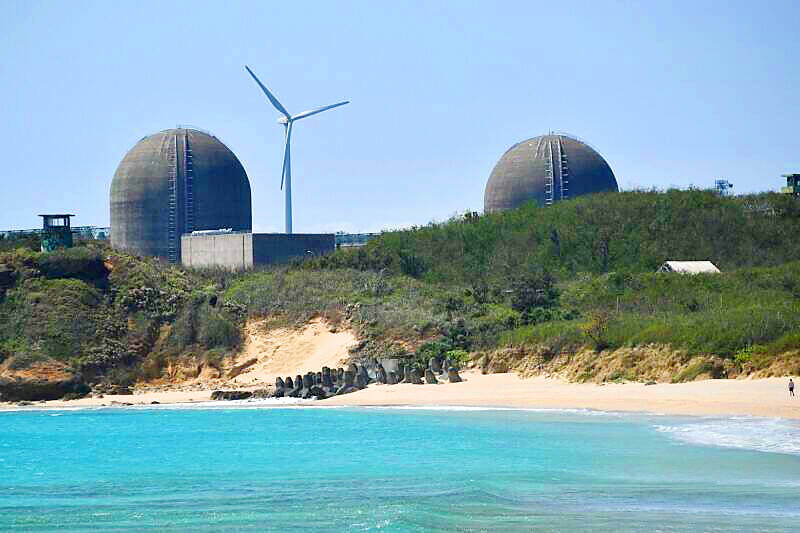New Taipei City Mayor Hou You-yi (侯友宜), the Chinese Nationalist Party’s (KMT) presidential candidate, supports reactivating or extending the use of Taiwan’s three completed nuclear power plants and using the unfinished fourth plant pending a safety evaluation, a spokesperson for his campaign told a news conference on Thursday.
KMT spokesperson Yang Chih-yu said that despite the government’s repeated denials, Taiwanese understand that the country faces an energy crisis.
The issue is severe enough that in its white paper this year, the American Chamber of Commerce in Taiwan warned that Taiwan was “far behind schedule” in its plans to phase out nuclear power and replace it with renewable energy, Yang said.

Photo: Taipei Times
Lee Li-chen (李利貞), a spokesperson for Hou’s campaign, said that Hou has proposed easing this situation by keeping nuclear power in the energy mix while pursuing a broader energy policy based on the principles of safety, stability and carbon reduction.
Specifically, Hou would reactivate the nuclear power plants in New Taipei City’s Shihmen (石門) and Guosheng (萬里) districts pending safety inspections, and grant them 20-year operating permits, she said.
Hou also supports extending the life of the Ma-anshan Nuclear Power Plant in Pingtung County, which has two reactors set to be shut down, one next year and the other in 2025, Lee said.
As for the Fourth Nuclear Power Plant, the construction of which was frozen in 2014 when it was near completion, Hou would bring it into operation, provided it passed a safety inspection by a team of international experts, Lee said.
If enacted, Hou’s proposals would mark a sharp break with the policies of the Democratic Progressive Party (DPP), which, since taking office in 2016, has prioritized phasing out nuclear power by 2025.
The government initially expected to achieve an energy mix of 50 percent natural gas, 30 percent coal and 20 percent renewable energy by 2025, but fell behind schedule on renewable energy development, and has also run into setbacks in building its natural gas capacity infrastructure.
Those delays have led to concerns that Taiwan could face energy shortfalls in 2025 and 2026, and a lack of low-carbon energy in the second half of the decade.
Despite this, DPP officials, including the party’s presidential candidate, Vice President William Lai (賴清德), have said that the 2025 target can still be met without risking energy shortages.
Last year, 82.42 percent of the energy generated in Taiwan came from fossil fuels (mainly coal and liquified natural gas), while 8.28 percent came from renewables, 8.24 percent from nuclear power and 1.06 percent from pumped storage hydropower, Bureau of Energy data showed.

Chinese spouse and influencer Guan Guan’s (關關) residency permit has been revoked for repeatedly posting pro-China videos that threaten national security, the National Immigration Agency confirmed today. Guan Guan has said many controversial statements in her videos posted to Douyin (抖音), including “the red flag will soon be painted all over Taiwan” and “Taiwan is an inseparable part of China,” and expressing hope for expedited reunification. The agency last year received multiple reports alleging that Guan Guan had advocated for armed reunification. After verifying the reports, the agency last month issued a notice requiring her to appear and explain her actions. Guan

GIVE AND TAKE: Blood demand continues to rise each year, while fewer young donors are available due to the nation’s falling birthrate, a doctor said Blood donors can redeem points earned from donations to obtain limited edition Formosan black bear travel mugs, the Kaohsiung Blood Center said yesterday, as it announced a goal of stocking 20,000 units of blood prior to the Lunar New Year. The last month of the lunar year is National Blood Donation Month, when local centers seek to stockpile blood for use during the Lunar New Year holiday. The blood demand in southern Taiwan — including Tainan and Kaohsiung, as well as Chiayi, Pingtung, Penghu and Taitung counties — is about 2,000 units per day, the center said. The donation campaign aims to boost

The Kaohsiung Tourism Bureau audited six hotels in an effort to prevent price gouging ahead of Korean band BTS’ concert tour in the city scheduled for Nov. 19, 21 and 22 this year. The bureau on Friday said that the audits — conducted in response to allegations of unfair pricing posted on social media — found no wrongdoing. These establishments included the local branches of Chateau de Chine, Hotel Nikko, My Humble House, and Grand Hai Lai, it said, adding that the Consumer Protection Commission would have penalized price gougers had the accusations been substantiated. The bureau said the Tourism Development Act

BACK TO WINTER: A strong continental cold air mass would move south on Tuesday next week, bringing colder temperatures to northern and central Taiwan A tropical depression east of the Philippines could soon be upgraded to be the first tropical storm of this year, the Central Weather Administration (CWA) said yesterday, adding that the next cold air mass is forecast to arrive on Monday next week. CWA forecaster Cheng Jie-ren (鄭傑仁) said the first tropical depression of this year is over waters east of the Philippines, about 1,867km southeast of Oluanpi (鵝鑾鼻), and could strengthen into Tropical Storm Nokaen by early today. The system is moving slowly from northwest to north, and is expected to remain east of the Philippines with little chance of affecting Taiwan,